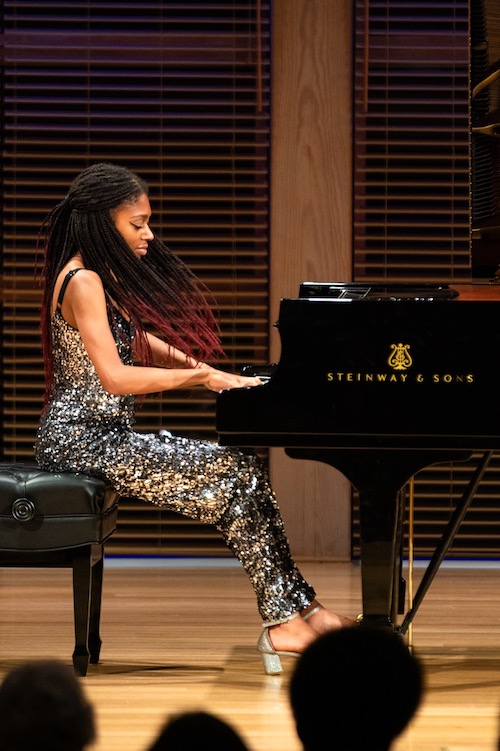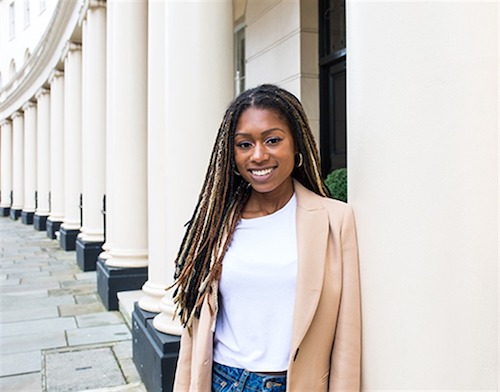Pianist Kanneh-Mason inaugurates new Groton venue for the Celebrity Series

Isata Kanneh-Mason opened the Celebrity Series classical season at the new Groton Hill Music Center Friday night. Photo: Robert Torres
Friday was a night of firsts for the Celebrity Series. It was, for one, the start of the organization’s 2023-24 classical music season.
The occasion also inaugurated the institution’s relationship with the new Groton Hill Music Center. Meadow Hall, where yesterday’s recital was presented, is a find: bright, airy, with excellent sight lines and comfortable seating (not to mention abundant free parking), the space is considerably more intimate than Jordan Hall and aesthetically more inviting than Pickman Hall.
It was fitting, then, that the evening should also mark the Series return of pianist Isata Kanneh-Mason. She is no stranger, having appeared twice before (most recently in 2022 with her brother, the cellist Sheku. Last night was the British musician’s well-deserved solo debut.
To judge from Friday’s performance, Kanneh-Mason and the venue are well-suited to one another. Throughout the night, her Steinway’s sound was full and present, the notes at its outer extremes projecting purely, and the pianist’s prismatic tonal palette emerging with emphatic brilliance.
That was especially true in her reading of Frédéric Chopin’s Piano Sonata No. 3. Written in 1844, the piece mixes tempestuous expressive content with a treatment of the keyboard that is fundamentally orchestral in terms of textural density and sonority.
Last night, Kanneh-Mason dispatched its outer movements with gleaming tone and bold dynamic contrasts. While her interpretation was marked by rhythmic clarity and – in the finale, especially – a certain swaggering character, it didn’t want for subtlety: the Allegro maestoso’s second subject floated and was beautifully voiced.
In the Scherzo, she brought a fleet touch to the music’s outer thirds (especially its low-register passagework) and glowing warmth to the Trio. The Largo was both well-directed and tenderly shaped.
Many of the same qualities also marked Kanneh-Mason’s account of Fanny Mendelssohn’s Easter Sonata. Dating from the late 1820s, the piece had long been assumed to have come from the pen of Fanny’s brother, Felix, though recent scholarship has definitively established its authorship.
Either way, it’s an engaging work by a talented young composer. True, some of the score stands out more for gestural moments rather than convincing larger musical argument: the poignant opening hymn of the Largo, for instance, or the cascading chords in the Scherzo.
But the outer sections showcase an intriguing if fitful musical personality. The first movement is unsettled, but, on Friday at least, never seemed to be at a loss for lyrical or dramatic purpose. Neither did the finale, whose stormy aspect owes much to a bass line that, in Kanneh-Mason’s hands, seemed to anticipate the stride piano style of a much different time and place.
In Franz Joseph Haydn’s Piano Sonata No. 60, the pianist proved an adept navigator of the byways of late-Classical syntax. Kanneh-Mason’s focus on the melodic line in this 1794 effort was consistently assured, as was her grasp of the composer’s often-playful rhetorical style, especially in the whimsical finale.
Given the strengths of Friday’s recital, Kanneh-Mason’s wayward rendition of Robert Schumann’s Kinderszenen came as a surprise. True, there were inviting spots—a spirited “Ritter von Steckenpferd” and a mighty Trio in “Wichtige begebenheit” among them.
But the larger performance was blustery and shallow, marred by dropped notes and an overriding approach to this music that was oddly dry and literal. Accordingly, few of its dreamy and poetic qualities emerged.
Those missteps were redeemed by the Chopin Sonata that followed, as well as Kanneh-Mason’s encore of that composer’s Prelude No. 24. Last night, this tumultuous little piece functioned like a short fireworks show capping a festive night.
The program will be repeated 8 p.m. Saturday at Jordan Hall. celebrityseries.org
Posted in Performances

